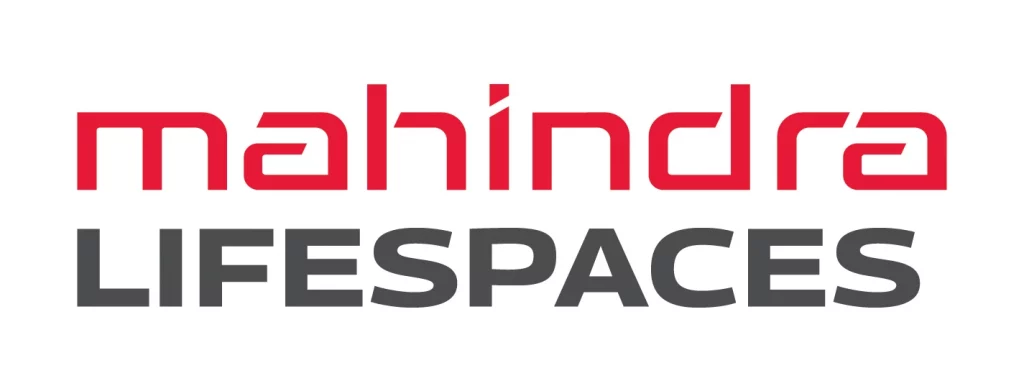
How we are making change
Fostering a culture of Safety
Mahindra Lifespaces has been at the forefront of embracing the positive safety culture, a journey we started five years back. Starting from a reactive organisation, we matured into a proactive one, perceiving risks and rectifying them systematically. A year back, we initiated the journey of creating an inclusive safety culture, wherein all in the system operate with the realisation that ‘safety is a way of life and our colleague’s actions in safety can be influenced by ours’. Our leadership is actively involved and demonstrates an uncompromised approach in safety-related management. The shared safety vision of the Company encourages the workforce to enthusiastically participate in ensuring safe and secure working conditions for all, including the labour force at sites. In India, construction industry is marked by its volatility and high turnover of the workforce. For a dynamic workforce constituting of both unskilled or semi-skilled manpower, constant awareness is the single most important aspect that relates to the workforce in restricting the accidents. Awareness, coupled with strong robust systems has reshaped Mahindra Lifespaces from an organisation with a reactive culture, to embracing the concept of an "Inclusive safety culture".
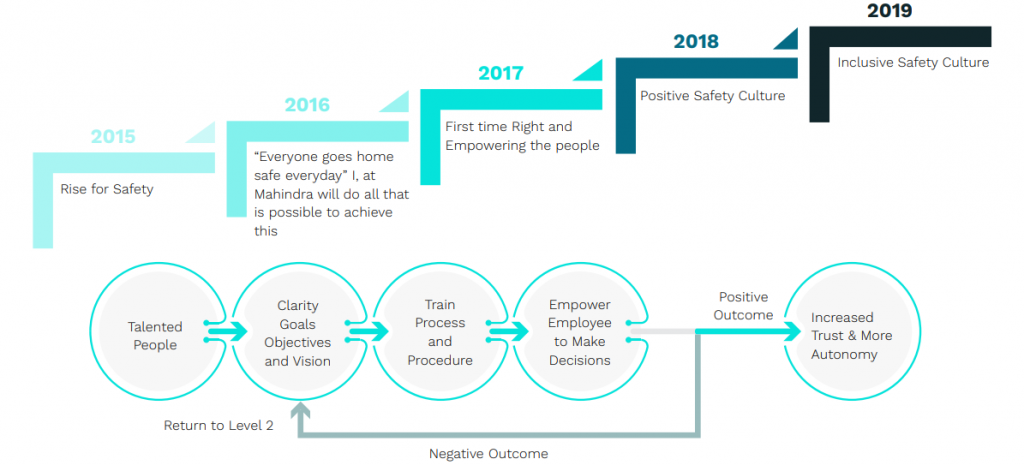
Furthermore, Mahindra Lifespaces is an ‘Integrated Management System’ certified organisation since 2013. In 2018-19, we migrated from OHAS 18001 to ISO 45001 standard for Health, Safety & Environment which is complementary to our OHS risk management strategies. Occupational health and safety (OHS) is crucial, as it allows us to maintain uninterrupted operations, while ensuring health and safety of our workforce.
Our structured OHS management enables us to identify and mitigate risk at a preliminary stage, while deploying early warning systems to ensure a safe workplace. Our adept engineers, supported by the workforce, conduct project evaluations to identify operational risks, unsafe acts and concerns at the site level. The identified risks are represented through SMAART (Safe Method and Risk Reduction Technique) card, which contains safety related information for the anticipated risk at the site. As part of SMAART, interproject trainings are also leveraged to utilize the expertise of safety specialists across the projects. Additionally, we utilise monitoring tools such as Daily Work Management (DWM), for conducting periodic inspections, and incident analysis to be shared with the head office. The safety culture of the organisation is supported by trainings and capacity building of our workforce. The trainings are aimed at enabling the workforce to perceive, report, and act on any unsafe and hazardous working conditions. We carry out customised training programs on risk mitigation, technical skill improvement as well as statutory requirements on Environment, Health and Safety. SOTERIA, safety newsletter for capacity building on issues pertaining to environmental, health, and safety is issued fortnightly to all the associates. Heat related preventive healthcare has been included in our health and safety program.
- Work hours during hottest part of the day is restricted
- Training is provided to labourers for handling heat exhaustion
Institutionalised safety management system
We conduct in-depth analysis of any incidents that might occur at our sites, with learnings being communicated throughout sites using existing mechanisms for sharing information. This is done as an effort to ensure that similar incidents do not repeat. The overall outcome of the efforts are zero reportable accidents, drop in first aid cases, and suitable awareness among operatives at all levels paving the way for good safety culture in the organisation. In our pursuit to provide a safe and dignified workplace, we also work to build awareness of human rights among employees. We provide one-hour training on human rights to our employees as part of their induction process. We conduct preventive health examinations annually, especially for employees in the vulnerable age group. The project teams showed better involvement, participation, visibility and awareness at all levels.
A new KRA was introduced in 2020-21 - not to have repeated observations and closure of observations within 48 hours. The locations have completed several audits without any repeated observations and has reverted with an immediate closure of any non-conformances. Other KRAs introduced include zero non-reportable incidents, 50% Y-o-Y reduction in first aid cases, and 6X Y-o-Y increase in near miss reporting. We witnessed a 73.1% reduction in first aid cases and 20X increase in near miss cases. Training is the key to enhance the awareness to have a responsive workforce and create an inclusive safety culture. We conducted an average of 7 hours of training per person during the year, a 21% increase from 2019-20. We reported zero fatalities and reportable workrelated injuries and ill-health, while accumulating 75,248,153 hours of safe man hours till date. The work-related injuries were calculated based on 1,000,000 hours worked.
Safety during the Pandemic: Our COVID-19 response
In an unorganised sector like construction in India, lockdown and the fear of the unknown was enough to drive the workforce away from project sites to the security of their hometowns. During the daunting lockdown, Our persistence on a proactive and inclusive safety culture facilitated effective management of the pandemic situation across operations related to corporate, sites, and other relevant stakeholders. Our first and foremost priority during the pandemic was to ensure the health and safety of our employees, labour workforce, customers, and other stakeholders. Our corporate OHS team raised early concern regarding the pandemic and its possible business continuity risks. The team alerted corporate, sites and other stakeholders on the preparedness on COVID-19 in very early stages, handholding them through the unprecedented chaos. The safety team visited the sites regularly, providing visible leadership and commitment during COVID-19 lockdown. They remained accessible to the workforce throughout the ordeal and motivated them to not migrate back to homes. Our actions to ensure safety of the workforce can be segregated into three phases.
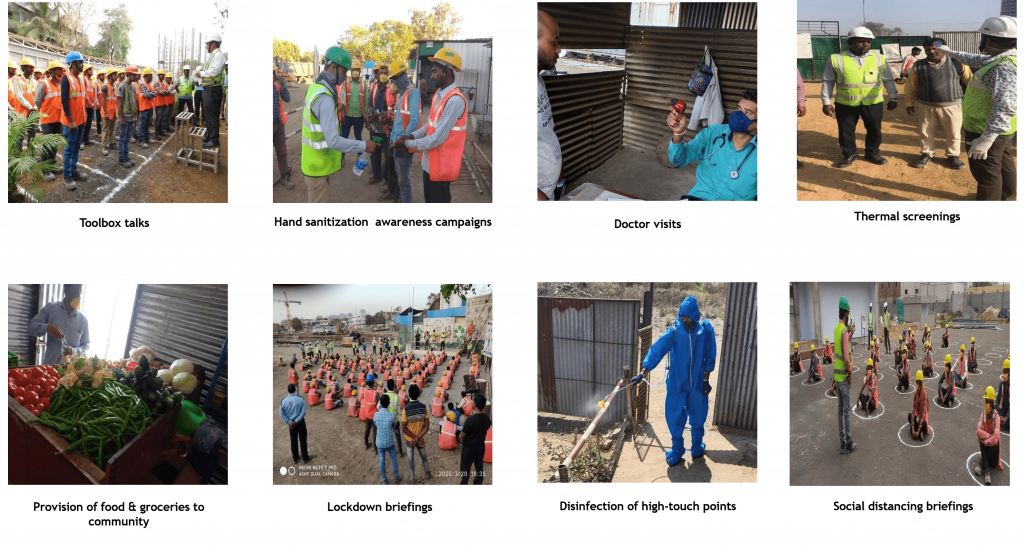
With the lifting of the lockdown measures, we resumed our operations in a phased manner while enforcing strict protocols for health and safety. We also developed and conveyed to our employees ‘Back to Office’ guidelines highlighting aspects like behaviour at workplace, maintenance of hygiene and safe practices, and guidelines in case of sickness and health emergency. All the security personnel and site sales team were trained on the SoPs. Thermal screening was mandatory at all locations, along with hand wash/sanitisation. Each site was required to submit compliance status. Mahindra Lifespaces demonstrated how an agile safety culture can impact emergency response and preparedness and provide robust facilitation to pandemic management strategies as well as ensuring health and safety performance of our businesses and operations.
Anticipating the second wave of COVID-19 and high number of cases in the states of Maharashtra, Tamil Nadu, Karnataka, Rajasthan, and Delhi, where Mahindra Lifespaces has various interests, an early warning system was rolled out. This was followed with specific communication with the locations on areas of concern and a revised SOP on safe working conditions during COVID. Further, for Maharashtra, we coordinated with ICMR approved labs and made a central provision for ensuring RT-PCR testing to be carried out seamlessly.
For our efforts during the pandemic, we were awarded for our exemplary service.
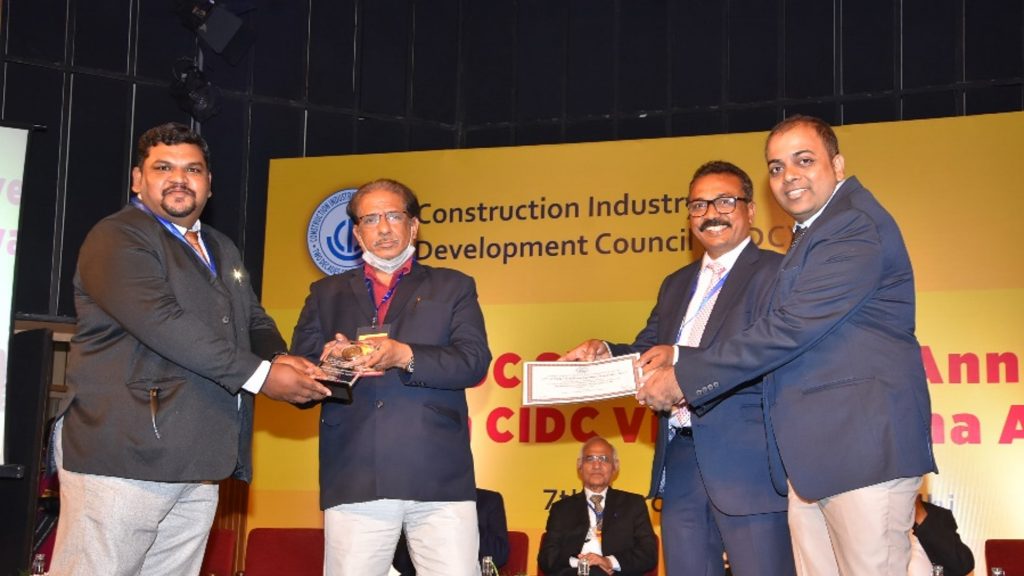
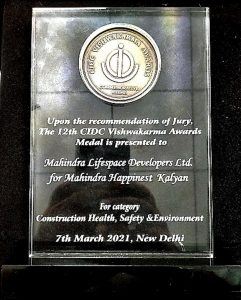
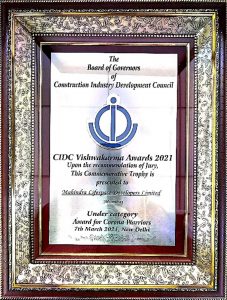
Emergency Response Team
At Mahindra World City Jaipur, we witnessed some instances of chemical fires. During the analysis of the incident, the need for a structured Emergency Response Team (ERT) was established. The site ERT seeks for a better coordination amongst response team members with clear cut defined responsibilities, crowd control management, augmentation of resources, and availability of proper equipment during emergency situations.
Emergency Response Team formation was revisited with clear cut defined responsibilities, and identification and engagement of necessary stakeholders in an emergency. Structured roles and responsibilities have been defined, and fire-fighting equipment has been upgraded to cater for chemical/gas fire with procurement of appropriate PPEs. First aid training was provided to 25 employees through Indian Red Cross Society.
The intervention has allowed the team to effectively coordinate amongst emergency team members resulting in improved emergency preparedness and effective response. The clarity on roles and responsibility for each team member through mock drill training allowed for effective coordination with stakeholders. The trust amongst customers on the team’s emergency response ability also improved our customer satisfaction score.
